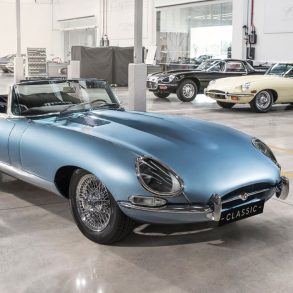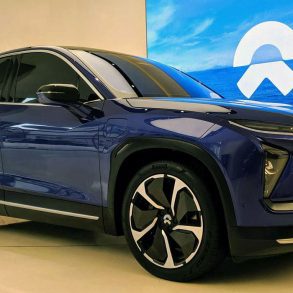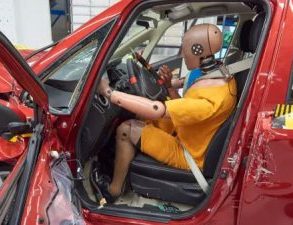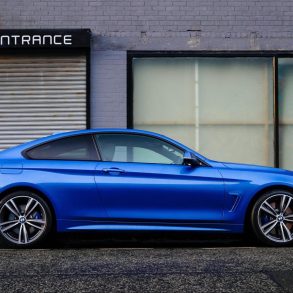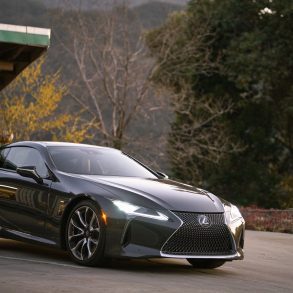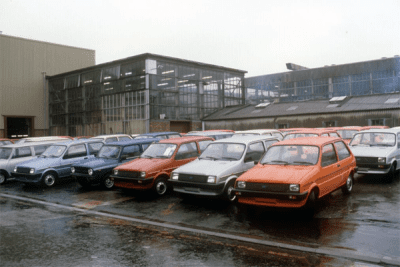 Car production in the UK has had its fair share of changing fortunes over the years. The demise of British Leyland in the 1980s and ’90s was offset by investments in car plants by Japanese automakers Nissan (Sunderland, 1984), Honda (Swindon, 1985) and Toyota (Burnaston, 1989). Even with all surviving British brands currently in foreign ownership UK manufacturing has thrived, as for the past three years more cars were produced in the UK than in France. UK car production is expected to reach a record 1,95 million cars next year, beating the previous high from 1972.
Car production in the UK has had its fair share of changing fortunes over the years. The demise of British Leyland in the 1980s and ’90s was offset by investments in car plants by Japanese automakers Nissan (Sunderland, 1984), Honda (Swindon, 1985) and Toyota (Burnaston, 1989). Even with all surviving British brands currently in foreign ownership UK manufacturing has thrived, as for the past three years more cars were produced in the UK than in France. UK car production is expected to reach a record 1,95 million cars next year, beating the previous high from 1972.
Jaguar-Land Rover has overtaken Nissan to become the biggest producer of vehicles in the UK, after the new Indian owner Tata invested over £ 11 billion in UK manufacturing since 2009. In six years time, production the two luxury brands has more than tripled from 158.000 units when it was on the brink of bankruptcy to almost 490.000 units in 2015, 81,5% of which is exported. During that period, J-LR’s UK payroll has increased more than five-fold to 35.000 employees.
Earlier this week Aston Martin gave UK car manufacturing another boost, when it decided to invest £ 200 million in its second UK factory in Wales instead of opting for Eastern Europe, Alabama, USA or any of the 18 other places it had considered. This will create another 4.000 jobs in the UK and comes right at the time when the UK manufacturing industry may be threatened by the upcoming referendum in June on a British exit from the European Union.



 This is significant for the automotive industry as 57,5% of the British production, especially that of the Japanese manufacturers, is exported to mainland Europe, compared to 10,9% to the US and 7% to China. A Brexit would not only have an effect on the exchange rate between the British Pound and the Euro, but could also potentially create barriers which would complicate trade between the UK and mainland Europe. Then again, this seems very unlikely considering the amount of trade both ways and the mutual benefits of that trade, especially for German manufacturers which sold over 700.000 cars in Britain last year. Prime Minister David Cameron, who is fighting for his country to stay with the EU, said in a speech yesterday that the voices of the auto execs are “worth listening to as we make more cars now in the northeast of England than the whole of Italy because of the great success of manufacturers like Nissan”.
This is significant for the automotive industry as 57,5% of the British production, especially that of the Japanese manufacturers, is exported to mainland Europe, compared to 10,9% to the US and 7% to China. A Brexit would not only have an effect on the exchange rate between the British Pound and the Euro, but could also potentially create barriers which would complicate trade between the UK and mainland Europe. Then again, this seems very unlikely considering the amount of trade both ways and the mutual benefits of that trade, especially for German manufacturers which sold over 700.000 cars in Britain last year. Prime Minister David Cameron, who is fighting for his country to stay with the EU, said in a speech yesterday that the voices of the auto execs are “worth listening to as we make more cars now in the northeast of England than the whole of Italy because of the great success of manufacturers like Nissan”.
Threats of an industrial exodus from possible Brexit
When politicians were still debating whether or not to hold a referendum, some of the more vocal executives in the automotive industry threatened to divert future investments to their factories in mainland Europe, but now that a vote on staying or leaving is imminent and the possibility of a Brexit has become a reality their statements have softened, so what’s behind this change of tone?
 Pro-EU campaigners have warned a Brexit could lead to job losses in an industry employing almost 800.000 people. For example, Mike Hawes, chief executive of the Society of Motor Manufacturers and Traders (SMMT), supports the pro-EU party saying in a KPMG study from 2014 that “it is vital for the automotive industry that the UK maintains a strong and stable relationship with the EU. Continued growth in an intensely competitive global marketplace is far from guaranteed and depends heavily on global economic conditions and political stability. Europe is our biggest trading partner and the UK’s membership of the European Union is vital for the automotive sector in order to secure future growth and jobs”. He used to have an outspoken ally in Carlos Ghosn, CEO of Nissan which operates the biggest auto plant in the United Kingdom with 6.500 employees. Ghosn has claimed several times, even as far back as 2013 that “leaving the EU would be detrimental to Nissan’s UK operations and “a British exit from the EU would cause us to seriously reconsider our strategy and future investments in the country”.
Pro-EU campaigners have warned a Brexit could lead to job losses in an industry employing almost 800.000 people. For example, Mike Hawes, chief executive of the Society of Motor Manufacturers and Traders (SMMT), supports the pro-EU party saying in a KPMG study from 2014 that “it is vital for the automotive industry that the UK maintains a strong and stable relationship with the EU. Continued growth in an intensely competitive global marketplace is far from guaranteed and depends heavily on global economic conditions and political stability. Europe is our biggest trading partner and the UK’s membership of the European Union is vital for the automotive sector in order to secure future growth and jobs”. He used to have an outspoken ally in Carlos Ghosn, CEO of Nissan which operates the biggest auto plant in the United Kingdom with 6.500 employees. Ghosn has claimed several times, even as far back as 2013 that “leaving the EU would be detrimental to Nissan’s UK operations and “a British exit from the EU would cause us to seriously reconsider our strategy and future investments in the country”.
Softening their tones
However, last September Nissan confirmed it would build the next generation Juke crossover in the UK and more recently Ghosn toned down his voice but didn’t change his preference when he stated in a press release “We are a global business with a strong presence in Europe. Our preference as a business is, of course, that the UK stays within Europe – it makes the most sense for jobs, trade and costs. For us, a position of stability is more positive than a collection of unknowns”. He added: “We obviously want the Nissan UK plant and engineering center to remain as competitive as possible when compared with other global entities, and each future investment opportunity will be taken on a case by case basis, just as it is now”.
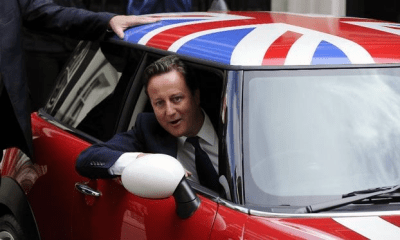 Ghosn isn’t the only one to have softened his rhetoric after a referendum became official. Steve Odell, Ford chief executive of European operations before Jim Farley took over, was quoted last year to say the company “would be forced to reconsider its UK operations if the country voted in favor of leaving the European Union”. But earlier this week, when a referendum was certain, Ford CEO Mark Fields told Bloomberg Television that the automaker believes it is really important for the UK to be part of a single market and that having the UK as part of a reformed EU “is in the best interest of the UK”. Again: same message, but less threatening.
Ghosn isn’t the only one to have softened his rhetoric after a referendum became official. Steve Odell, Ford chief executive of European operations before Jim Farley took over, was quoted last year to say the company “would be forced to reconsider its UK operations if the country voted in favor of leaving the European Union”. But earlier this week, when a referendum was certain, Ford CEO Mark Fields told Bloomberg Television that the automaker believes it is really important for the UK to be part of a single market and that having the UK as part of a reformed EU “is in the best interest of the UK”. Again: same message, but less threatening.
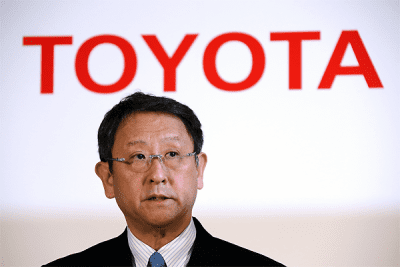 At Toyota, Johan van Zyl, President and CEO of Toyota Motor Europe illustrated: “We have carefully considered the implications for our manufacturing operations, should the UK leave the European Union. We are committed to our people and investments, so we are concerned that leaving would create additional business challenges. As a result we believe continued British membership of the EU is best for our operations and their long term competitiveness”. But Akio Toyoda, CEO of the company his great-grandfather founded and Van Zyl’s superior, seems more devoted to the UK. In an interview with the Financial Times he reveals that when the Burnaston plan was constructed 25 years ago, his predecessors buried a time capsule at the plant and pledged the company would still be there to open it in the year 2090. “From now on, like Japan, we may face some pretty tough times in the UK market, but we want to deepen our roots to deliver ever better cars, so when that capsule is opened after 100 years, all can see we’ve built a truly British company”.
At Toyota, Johan van Zyl, President and CEO of Toyota Motor Europe illustrated: “We have carefully considered the implications for our manufacturing operations, should the UK leave the European Union. We are committed to our people and investments, so we are concerned that leaving would create additional business challenges. As a result we believe continued British membership of the EU is best for our operations and their long term competitiveness”. But Akio Toyoda, CEO of the company his great-grandfather founded and Van Zyl’s superior, seems more devoted to the UK. In an interview with the Financial Times he reveals that when the Burnaston plan was constructed 25 years ago, his predecessors buried a time capsule at the plant and pledged the company would still be there to open it in the year 2090. “From now on, like Japan, we may face some pretty tough times in the UK market, but we want to deepen our roots to deliver ever better cars, so when that capsule is opened after 100 years, all can see we’ve built a truly British company”.
Opel-Vauxhall CEO Karl-Thomas Neumann was equally bullish on the UK: “We will not turn our back on England. If Britons voted to leave the EU, life would carry on, we would continue to find ways to invest”.
British manufacturing excellence stronger than economics
It’s understandable that the current situation of uncertainty benefits nobody in the industry, and that a British exit from the European Union would bring even more uncertainty. In that light it makes sense that most automakers with a manufacturing presence there would prefer the United Kingdom to remain a part of the greater free trade union. But their earlier threats have toned down now that a Brexit has become a viable possibility. Some still try to influence the outcome of the referendum by expressing their worries about potential job losses, but they may be overstating them slightly. You see, there’s a reason why UK manufacturing is so successful and why these companies develop most of their cars for the European market here.
The expertise of British engineers is widely celebrated and the image of the UK as a high-tech industry for premium products like Rolls-Royce, Bentley, Aston Martin, Jaguar-Land Rover and Mini is a huge factor in offsetting higher hourly wages compared to, say, Eastern Europe which is a growing low-cost manufacturing hub for brands like Hyundai, Kia and Dacia, or for low-budget minicars like the Toyota-PSA triplets (Kolin, Czech Republic), the VW Group triplets (Bratislava, Slovakia) and Renault Twingo (Novo Mesto, Slovenia). For example, Torsten Müller-Ötvös, CEO of BMW-owned Rolls Royce has been quoted to say “Are you kidding me? This brand is so truly British that it belongs to Britain and it is also part of our success story that we are from Britain”.
As a bonus I’ll give you this interactive StoryMap, thanks to FA Wheels in the UK. It highlights the interesting story of car manufacturing in Britain. It gives you digital tour around the major manufacturing hubs in the Kingdom, illustrated with videos and interesting facts. Check it out below.



